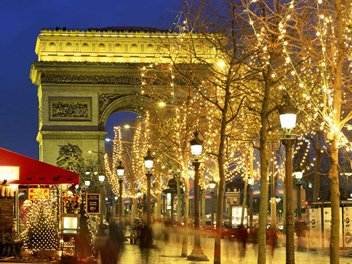In French class right now, I am learning multiple things. As of today, March 23 2009, we are learning vocabulary about hotels. We do many activities on our vocabulary. We do lots of worksheets about hotels and inns and hostels. We are also learning the future tense. Like instead of saying 'I am going' you would say 'I will go.' We had to make a whole presentation about the future pretending we were fortune tellers and telling our partner their fortune. It was really fun. We also do a lot of oral acitivities like listening to a voice speak french from the T.V. and writing oui ou non (yes or no) to 10 or so questions that are on the board. It's funny because sometimes we spend half the class time trying to get to the right excercise. We also have a verb of the week every week. It helps us learn a new verb every week and then we can remember them more easily. our homework is usually to write 10 or 12 sentences with the new verb. The next day we will put them all on the board and then go over them. Our class is always interesting. I love it :)
Culture

There is so much French culture I could never fit it all on one web page. Instead I am going to zone in on French food. Traditional French culture places a high priority on the enjoyment of food. French cuisine was codified in the 20th century by Georges Auguste Escoffier to become the modern version of haute cuisine. Escoffier's major work, however, left out much of the regional character to be found in the provinces of France. Gastro-tourism and the Guide Michelin helped to bring people to the countryside during the 20th century and beyond, to sample this rich bourgeois and peasant cuisine of France. Basque cuisine has also been a great influence over the cuisine in the southwest of France. Ingredients and dishes vary by region. There are many significant regional dishes that have become both national and regional. Many dishes that were once regional, however, have proliferated in different variations across the country in the present day. Cheese and wine are also a major part of the cuisine, playing different roles. France is one of the oldest wine-producing regions of Europe. France now produces the most wine by value in the world. Bordeaux wine, Bourgogne wine and Champagne are important agricultural products. The French typically eat only a simple breakfast of coffee or tea, served traditionally in a large handleless bowl, and bread, breakfast pastries (croissants), or yogurt. Lunch and dinner are the main meals of the day. Formal four course meals consist of a starter course, a main course followed by a salad course, and finally a cheese and/or a dessert course. While French cuisine is often associated with rich desserts, in most homes dessert consists of only a fruit or yogurt. Food shopping in France was formerly done almost daily in small local shops and markets, but the arrival of the supermarket and the even larger in France have disrupted this tradition. With depopulation of the countryside, many towns have been forced to close shops and markets.




